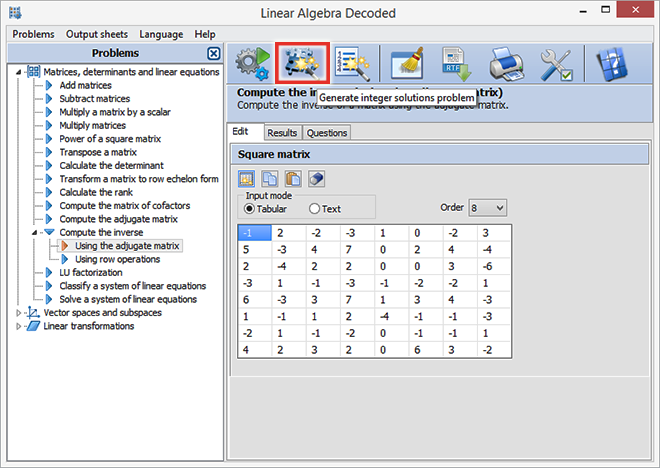One of the great potentialities of Linear Algebra Decoded is the possibility to generate problems where the coefficients are integers, and whose solution meets some given restrictions, so it allows students to generate problems covering different scenarios they can try, and in the same way it allows professors to generate problems that are convenient to use in exams. In this article we will explain how to use Linear Algebra Decoded to generate invertible matrices with integer coefficients where the inverse matrix has also integer coefficients.
Finding a square invertible matrix with integer coefficients is extremely easy, it is enough that its columns are linearly independent, which will be true in most cases when selecting its coefficients randomly; but if we want to find a matrix with integer coefficients whose inverse also has integer coefficients, then, it is no longer so easy, because we have to guarantee that the determinant of the matrix divide each of the coefficients of the adjugate matrix. Notice we can always guarantee that the inverse will have integer coefficients, independently of the adjugate matrix, if we get a matrix which determinant is 1 or -1.
When we use Linear Algebra Decoded and use the option to generate a problem to compute the determinant of a matrix, it allows us to specify the value we want the determinant to have for the matrix it will generate, using 1 as the default value. Regardless of the size of the matrix, the program will return a matrix whose determinant is equal to the specified value, and it will also try to fulfill that the modular value of the coefficients of the matrix are smaller than the value defined in the program configuration window.
When it is requested to generate a matrix to calculate its inverse, the program will generate a matrix with integer coefficients whose determinant is 1 or -1, which, as seen above, will guarantee that the inverse is also a matrix with integer coefficients.

When the objective of the problem is only the calculation of the inverse using the adjugate matrix method, the complexity of the calculations needed to get the inverse is not affected by the fact that the determinant is not a divisor of all the coefficients of the adjugate matrix, because the division is only used in the last step of the process. But if the calculation of the inverse is only a step of a more complex problem where this result will be used in other calculations, or you want to use the method of elementary row operations to calculate the inverse, and the module of the determinant is not 1, then, this could bring with it the need to operate with fractional numbers, which normally has no interest for the Linear Algebra tests. For this reason, matrices with determinant equal to 1 or -1 are suitable for use in exams, since there are many problems that require to calculate the inverse of a matrix, as an intermediate step.
Today we have discussed only one of the simplest examples of the use of the generating problems tool that Linear Algebra Decoded offers you. Download the demo version for free and try this valuable functionality, although for other more complex problems you will need to buy the full version.
Do you have a question or comment? Please, let us know in the Comments section, we will be happy to read it and answer you.








Your comment